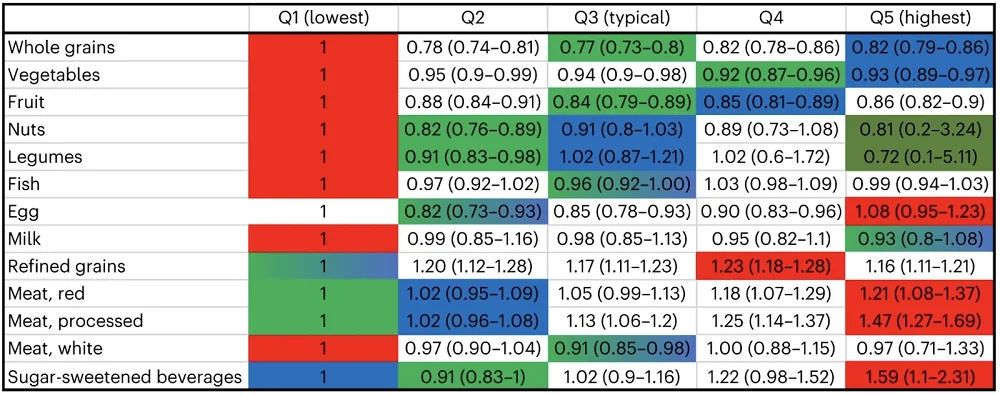Healthy Diet Linked to Massive Gains in Life Expectancy
- The UK's Eatwell guidelines are good, but they may not be perfect.

A new study has found that switching to longevity-associated dietary patterns was associated with up to a 10-year gain in life expectancy for 40-year-olds and up to a 3.4-year gain for 70-year-olds [1].
Eat your way to longevity
Since the early twentieth century, average human life expectancy has risen enormously due to factors such as advances in medicine, decrease in poverty, and better sanitation. However, in the recent couple of decades, this progress has become much slower and even reversed its course in some countries, including the US [2].
One reason is that most of the initial impressive gains were due to a decrease in infant mortality and in the prevalence and deadliness of infectious diseases. Another is that it is notoriously hard to keep humans alive during the latest few years of their lives, when they are attacked by several age-related diseases simultaneously. According to estimates, eradicating cancer alone, which still seems like an impossible feat, would only increase the average life expectancy by about three years.
This illustrates the limitations of the traditional healthcare approach of fighting singular diseases after the symptoms appear. Geroscience, on the other hand, advocates for treating the underlying processes of aging, thus delaying the onset of numerous age-related diseases at once.
While geroscience sits on the cutting edge of biology, currently, the most effective arrows in its quiver are lifestyle interventions, such as dietary changes. What you eat and when you eat it can have a profound effect on your health. Therefore, it may be possible to estimate how effective dietary changes are in extending lives.
The naughty and the nice
This is what a new study from an international team of scientists, published in Nature Food, attempts to do. Using data from the UK Databank, a vast repository of biomedical data on half a million British citizens, the researchers identified “longevity-associated dietary patterns” by dividing consumption levels of several food groups into quintiles and calculating hazard ratios: here, the mortality odds for quintiles 2-5 compared to the lowest quintile.

In this image, red designates the unhealthiest patterns, green shows the healthiest ones, and blue is for the current recommendations from NHS’ Eatwell Guide. The two dark green rectangles, according to the researchers, “had large uncertainties”.
The results suggest that the longevity-associated dietary pattern includes a moderate intake of whole grains, fruit, fish, and white meat; a high intake of milk and dairy, vegetables, nuts and legumes; and a relatively low intake of eggs, red meat, refined grain, processed meat, and sugar-sweetened beverages.
However, the effect sizes differed significantly. The two “deadliest” types of food were processed meat and sugary beverages (which is in line with existing research) [3], while for red meat, the positive association with mortality was more attenuated. It is not always better to eat plenty or none of a certain food. Sometimes, the sweet spot seems to lie between those two extremes.
The model was adjusted for age, sex, socio-demographic area, smoking, alcohol consumption, and activity level. Further adjustment for body mass index and energy consumption showed slight reductions in inverse associations with mortality for whole grains, vegetables and fruits, a small reduction in risk from red meat, and stronger inverse associations for nuts and white meat.
Up to 10.4 additional years of life
The researchers then calculated average gains in life expectancy associated with switching to either Eatwell guidelines or the healthiest patterns. For a 40-year-old, switching from the median dietary pattern to the healthiest one was associated with a 3.1-year increase in life expectancy for females and a 3.4-year increase for males. Gains from switching to Eatwell guidelines were much smaller (1.3 and 1.4 years, respectively). The effect of switching to longevity-associated dietary patterns from particularly unhealthy ones was massive: 10.4 years for females and 10.8 years for males. Equally impressive, if initiated at the age of 70, such a change was still associated with more than a 5-year increase in life expectancy.
While populational nutritional studies are notoriously hard to interpret and can only establish correlation and not causation, this is our best tool to estimate the effect of dietary patterns on longevity, since longevity-focused randomized controlled trials are all but impossible. Reassuringly, the growing amount of data seems to point in one direction: a balanced healthy diet can greatly increase your chances of living longer, even if adopted later in life.
In conclusion, for middle-aged adults in the United Kingdom, sustained dietary improvement is predicted to increase life expectancy by about 3 years for both females and males. Importantly, for those with the least healthy dietary patterns, change to the longevity-associated dietary pattern is predicted to translate into approximately 10 years gain in life expectancy. Changing from an unhealthy dietary pattern to eating in line with the Eatwell Guide was associated with an 8 year life expectancy gain. Gains in life expectancy are lower the longer the delay in the initiation of dietary improvements, but even for those initiating dietary change at age 70 years, the gain in life expectancy is about half of that achieved by 40-year-old adults.
Literature
[1] Fadnes, L. T., Celis-Morales, C., Økland, J. M., Parra-Soto, S., Livingstone, K. M., Ho, F. K., … & Mathers, J. C. (2023). Life expectancy can increase by up to 10 years following sustained shifts towards healthier diets in the United Kingdom. Nature Food, 4(11), 961-965.
[2] Venkataramani, A. S., O’Brien, R., & Tsai, A. C. (2021). Declining life expectancy in the United States: the need for social policy as health policy. JaMa, 325(7), 621-622.
[3] Larsson, S. C., & Orsini, N. (2014). Red meat and processed meat consumption and all-cause mortality: a meta-analysis. American journal of epidemiology, 179(3), 282-289.








